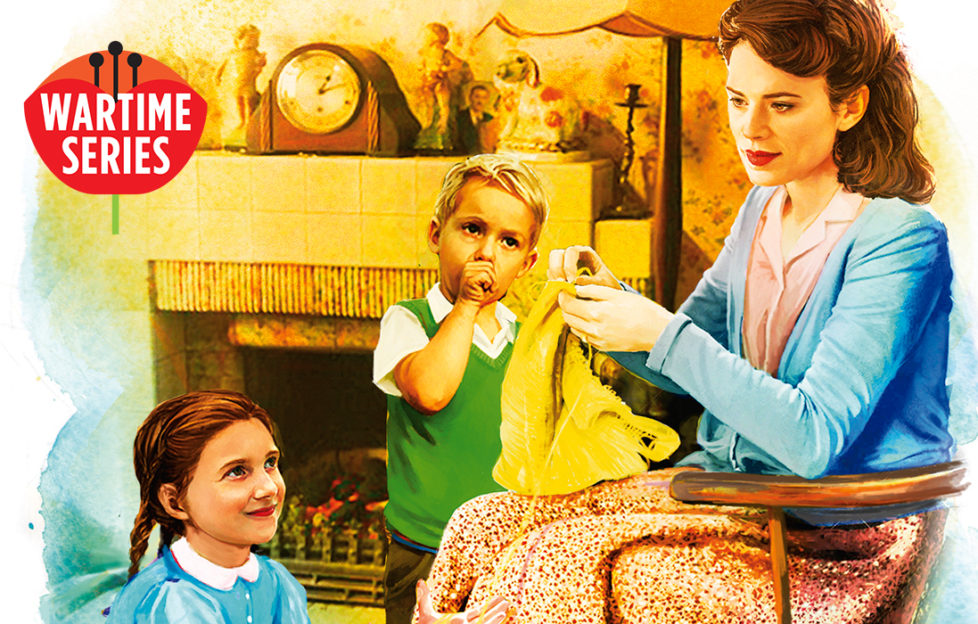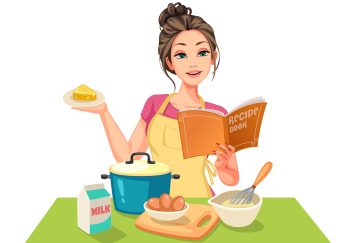Geoffrey’s Giraffe

WRITTEN BY ELAINE CHONG
Times were tough and uncertain, but a mother’s ingenuity helped her little family through the trauma of evacuation…
I handed the box of photographs to Jenny. She was waiting impatiently at the bottom of the ladder.
“I can’t believe these are still here,” I said as she helped me down from the last step. “I thought they’d got thrown out years ago.”
“It’s a good thing they didn’t, Auntie May, or we wouldn’t have anything to show my class. Everyone’s looking forward to you coming in for History Week and talking about what it was like to be evacuated.”
“Are you going to dress up as well? I can show you how to do your hair, if you like,” I offered.
“Of course!” she exclaimed.
She carried the battered old box downstairs, and we settled ourselves at the kitchen table.
“I suppose we were lucky that we had family to go to, and we always loved spending time with Grandad on the farm,” I told her as I scooped up a handful of photographs and spread them out in front of us. “Most of the other children in our street were evacuated a long way from home to live with strangers – some of them as far away as Wales.”
Jenny’s face was a picture of excited interest. “Well, that’s what this project is all about. And we’re raising money for a charity called War Child. It provides support to children whose families and communities have been damaged by war today.”
“Some things never change,” I said sadly. Quickly I gave myself a little shake. “Let’s find a picture of your grandad.” I shuffled through them looking for a small boy with a stuffed toy clutched to his chest.
Jenny suddenly let out a squeal of delight. “That’s him!” she cried, pointing to a faded, black and white picture. “What’s he’s got in his arms?”
I peered at the photograph. “Oh… that’s Geoffrey’s giraffe.”
Jenny picked it up and scrutinised it.
“It doesn’t look much like a giraffe. It’s got stripes.”
I laughed. “Mum knitted it for Geoffrey before we left London.”
That’s Grandad as well, isn’t it? He’s still got his giraffe with him!
Jenny pounced on another photograph. “That’s Grandad as well, isn’t it? He’s still got his giraffe with him!”
I took the photograph from her. It was Geoffrey, but he was older.
“He took that thing with him everywhere,” I said. “I’ve got a picture of him and your grandmother in this box from when they went on their first holiday together. You can see the giraffe hanging out of his backpack.”
“It sounds like a well-travelled giraffe,” Jenny observed with a smile.
“I think it became a kind of good luck charm. And it reminded Geoffrey of our mother and the sacrifices she made to keep us safe.”
I found myself counting the stripes on the little knitted toy with the tip of my finger, and all at once the memories came flooding back…
“I’m sorry, May, but you both have to go,” Mum said quietly. “The school’s going to close at the end of next week, and I’m not leaving you to fend for yourselves while I’m out at work.”
Geoffrey let out a despairing wail and clung to mum’s legs.
“I’m not going!” he screamed.
She prised him away from her side and carried on setting the table for tea, but her eyes filled with tears.
I grabbed Geoffrey’s hand and pulled him outside into the yard behind the kitchen. He threw himself into my arms and sobbed. He was five years old, still hadn’t learned his numbers or his A B C, but he knew as well as I did that if the school closed then we couldn’t stay.
“What are you bawling for?” someone called out. I turned and saw Mary Kenny’s face peering down at us from the top of the fence. She hauled herself up, heaved one leg over, and finally balanced herself with practised ease on the narrow edge.
Geoffrey buried his face in my shoulder.
“What’s up with him?” she demanded.
“We’re being evacuated to our grandad’s farm, but Geoffrey wants to stay here with Mum.”
Mary sighed loudly, folded her arms across her chest and assumed the air of someone who understood the sad ways of the world.
You can stay here and get blown to smithereens, or you can go and live in the country with your grandad
“Look, Geoffrey,” she said bluntly, “you can stay here and get blown to smithereens, or you can go and live in the country with your grandad.”
Geoffrey let out an even louder wail of despair and raced back into the kitchen.
I glared angrily up at her. “What did you have to say that for?” I shouted.
She shrugged her indifference.
“Least you know where you’re going,” she snapped. “We’re getting sent to the Rhondda Valley! Wherever that is,” she added under her breath. She launched herself off the fence and landed with a loud thump back in her own yard.
I followed Geoffrey inside. He was stretched out on the floor under the table, crying noisily. Mum was pretending to ignore him but I could see she was upset.
I crawled under the table and tried to drag him out by his feet but he kicked my hands away.
“Leave him be,” Mum said. “We’ll have tea, and then I’ve got a job for you.”
Geoffrey immediately stopped crying. I scrambled to my feet.
“What kind of job?” I asked her.
“Wait and see,” she said. She lifted the edge of the tablecloth. “You’ve got five seconds to put your bottom on this seat, Geoffrey, or you’re going straight up those stairs.”
After tea, Mum washed up, I dried and Geoffrey was trusted to put the plates and cups and saucers back on the dresser.
I loved the dresser. It was the only piece of furniture in our house that hadn’t fallen apart and been either nailed or glued back together. I understood that there was no money to replace anything when it broke, but the Welsh dresser somehow seemed indestructible. It represented the kind of security that was missing from our lives, since Dad went away to be a soldier, and Mum had to work in the factory at the end of road.
Mum sat down in her chair next to the hearth and we sat on the rug at her feet. She lifted two well-worn pullovers onto her lap. They’d been sitting in her sewing basket waiting to be darned. Instead, she cut a thread in one of them and began to pull it apart.
“Hold up your hands, May,” she told me. “You’re going to be my wool winder.” She carefully unravelled a length of yarn and then wound it between my outstretched hands. “We’re going to wind the wool into skeins, wash it and wind it into balls.”
“But what about the pullovers?” I said. “You won’t have anything to wear.”
“I’m going to make something new.”
“What is it?” Geoffrey asked.
“It’s a surprise,” Mum said.
By the time she’d finished unravelling both of the pullovers and wound the wool into skeins, my arms felt like they were ready to drop off. Geoffrey had already “dropped off”. He was curled up in a ball at Mum’s feet like a sleepy, little dormouse.
The next morning, she washed the skeins of wool and hung them out to dry. In the evening, Geoffrey and I took turns being the skein holder while she wound the wool into tight balls.
I picked up the balls of wool and tried to juggle them. Mum snatched them away and stowed them in the sewing basket.
“What are you going to make?” I asked her curiously.
May, but I need you to be brave
“If I told you, it wouldn’t be a surprise,” she said. She reached down and stroked the hair away from my face. “You’re a good, kind girl, May, but I need you to be brave. I can’t come with you when you go to Grandad’s. I’m going to put you on the train and then you have to take care of Geoffrey till you get to Ipswich.”
Geoffrey fell silent beside me; tears trickled down his cheeks. I wanted to cry as well. I didn’t want to be brave May.
I circled the date on the calendar, which Mum had agreed with Grandad he would collect us from the station. He’d reminded her that there were cows to be milked and chickens to be fed, and a myriad other tasks to perform between sunrise and sunset, so we had to get there promptly at twelve noon.
When the day arrived, I woke early. I shared a bedroom with Geoffrey. He was still sleeping. His face looked flushed but he wasn’t feverish; he’d simply cried himself to sleep in Mum’s arms.
The door creaked open and Mum crept into the room. She was wearing a brown and yellow striped jumper. It had short sleeves and a round collar. I recognised the wool at once. She put her finger to her lips, sat down on the bed and handed me a brown paper wrapped package. “This is for you,” she whispered, and she kissed my cheek. I sat up in bed and tore it open. It was a matching striped jumper. “I wanted you to have something of mine, something that will remind you of me when we say goodbye.”
I threw my arms around her. “It’s lovely,” I breathed into her ear. I sat back. “What about Geoffrey?” I said.
“Well, I didn’t have enough wool to make three jumpers, so I’ve made him something else.”
“A giraffe!” Jenny exclaimed, when I finished telling her the story. “Why on earth did she choose to knit a giraffe?”
“I think it was the brown and yellow wool. And Geoffrey was mad about zoo animals.”
“This is a wonderful story, Auntie May,” Jenny enthused. “I’ve asked Grandad if he’d talk to my class about what it was like being evacuated, but he says he can’t remember. You still remember, don’t you?”
I found tears springing to my eyes. Jenny reached across the table and took my hand.
I remember the day that we left, waiting on the platform for the train
“Oh yes,” I said. “I remember the day that we left, waiting on the platform for the train, thinking that we wouldn’t see our mother for a very long time. I can’t imagine how she must have felt because she knew there was a chance that she might never see us again.”
“When did you see her again? And your dad?” Jenny said quietly.
“Well, we didn’t see our dad until the end of the war,” I said. “But Mum soon decided that she missed us too much, so she gave up the house and came to live with Grandad.” I forced a smile. “I’ll never forget that day, waiting for the train, holding onto Mum’s hand as tightly as I could while she promised Geoffrey that we’d see her when he could count all the stripes on his giraffe.”
On the first day of History Week, Jenny arrived early so that I could pin up her hair into a victory roll. She was wearing a Forties-style dress and seamed stockings. I carefully applied some bright red lipstick and the transformation was complete.
“I think this is a wonderful idea,” I told her. “It brings history to life.”
Jenny nodded her agreement. “I copied the photographs onto my computer so we can show them on the big screen while you give your talk.”
“I’m feeling quite nervous,” I admitted with a grimace of fear.
I’ve got you a surprise
“I thought you might so I’ve got you a surprise,” she replied and she handed me a paper wrapped box. “You can open it when we get to school.”
“What is it?”
“If I told you, it wouldn’t be a surprise!”
With Jenny at the wheel, we reached the school in record time, and when we arrived I felt as if I’d been driven in a time machine. The playground was full of children dressed in the clothing of my childhood years: boys in flat caps and knitted waistcoats; girls in flared dresses and knee-length socks, all them with an evacuee tag on a string round their necks.
A bell sounded and the playground emptied. Jenny drew me along the corridor to her classroom.
“You can open your present now.”
I tore away the brown paper and lifted the lid of the box. I gasped. Inside was a brown and yellow striped giraffe.
“How on earth…?” I began.
“I found a knitting pattern on the internet,” she whispered. She put her arm around my shoulder and then turned to the children now seated and waiting with expectant smiles on their faces.
“This is my Great-Auntie May,” she told them,” and she’s going to tell you the story of Geoffrey’s giraffe.”
Don’t miss our other war stories…
-
A Boy Called Chancer
-
The Little Evacuee serial
-
Soldiers of the Somme
-
Precious Picture Of Love
-
Goodbye, Sweetheart
-
Too Late For Goodbyes




